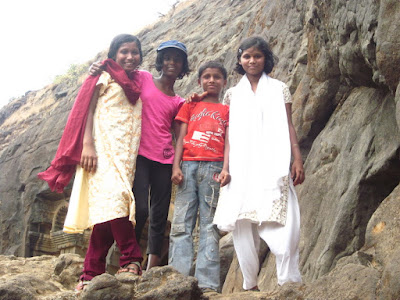




 A survey of street children in the city is also being simultaneously carried out. Dr. Sarda says the children are mostly part of a floating population. Since most of them are mostly runaways, they live on sidewalks, railway platforms, under flyovers; others live in shanty colonies with their families. A majority of them suffer from diseases like scabies, diarrhoea and malnutrition. "Begging and rag-picking are two occupations they take up to survive, but sometimes they pick up bad habits like Gutka (chewing tobacco) and even using narcotics", Sarda says. Serious illnesses like Hepatitis b, Leptospirosis and even HIV are not uncommon.
A survey of street children in the city is also being simultaneously carried out. Dr. Sarda says the children are mostly part of a floating population. Since most of them are mostly runaways, they live on sidewalks, railway platforms, under flyovers; others live in shanty colonies with their families. A majority of them suffer from diseases like scabies, diarrhoea and malnutrition. "Begging and rag-picking are two occupations they take up to survive, but sometimes they pick up bad habits like Gutka (chewing tobacco) and even using narcotics", Sarda says. Serious illnesses like Hepatitis b, Leptospirosis and even HIV are not uncommon.

 We immediately started supplementary nutrition for Sam for almost two and half months. Our Social Worker and Teacher counseled the family on how to care for the child and reported on his health status until Sam was in good enough physical condition. In the meantime, we tried to find sponsors or other resources for the operation. Our search led us to another hospital, which readily agreed to conduct the surgery and forwarded the request for the Chief Minister’s Fund. Finally, everything worked out and the decision to carry out operation was finalized.
We immediately started supplementary nutrition for Sam for almost two and half months. Our Social Worker and Teacher counseled the family on how to care for the child and reported on his health status until Sam was in good enough physical condition. In the meantime, we tried to find sponsors or other resources for the operation. Our search led us to another hospital, which readily agreed to conduct the surgery and forwarded the request for the Chief Minister’s Fund. Finally, everything worked out and the decision to carry out operation was finalized.
Now that school is out, Yashodhara children are attending a handicrafts workshop every morning at a Center located in the same NGO Campus that our Shelter Home is in. At this Center, visually impaired women are taught to weave so they can have a trade. The women, who learn to make bags, baskets, and various items made from plastic fiber, have designed workshops for the children who live at Yashodhara.
The first thing that children are learning to weave, are small rugs to sit on. To make them, the children use pieces of brightly colored cloth retrieved from tailor shops, and they are very creative in combining the colors. The next step for them will be to work with plastic fiber. As this material is not as flexible as cloth, children will have to put more effort into their creations, which will be bags for them to put their school lunch in.
It's amazing to see the enthusiasm with which children welcome any activity that is presented to them, and how they dive into learning without any hesitation. An attitude like this, open and inquisitive, coupled with the skills they are acquiring, are and will certainly be invaluable as life skills.
Let’s continue walking hand in hand with them.
Eshana - Live-in Volunteer at Yashodhara Shelter Home.

 Statements of support
Statements of support
 Uttam Módenes, born in the Basque Country, Spain, traveled to India for the first time at age 19 and fell in love with it. He discovered mystic India, "full of smiles, colors and aromas", but also the "abject poverty, disregard, resignation and indignity" which a large part of its population lives in. He is the president of Fundación Asha-Kiran (Ray of Hope, in Hindi), which supports vulnerable children. This NGO organized a photo exhibition inRenteria, Basque Country, in March.
Uttam Módenes, born in the Basque Country, Spain, traveled to India for the first time at age 19 and fell in love with it. He discovered mystic India, "full of smiles, colors and aromas", but also the "abject poverty, disregard, resignation and indignity" which a large part of its population lives in. He is the president of Fundación Asha-Kiran (Ray of Hope, in Hindi), which supports vulnerable children. This NGO organized a photo exhibition inRenteria, Basque Country, in March.The 492 Euro collection was donated to Asha-Kiran in its entirety to support the Foundation’s social work with vulnerable children in India.
We are thankful for the work of our co-worker in Ribaforada, and the solicitous participation of both entities to present this play, which has brought together enjoyment, art and caring hearts.